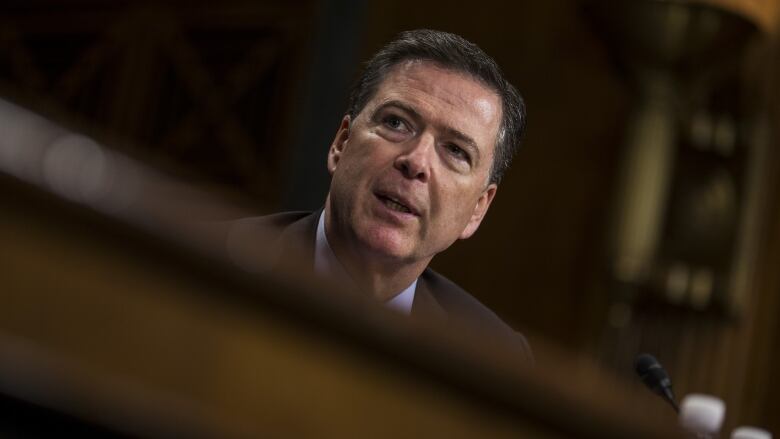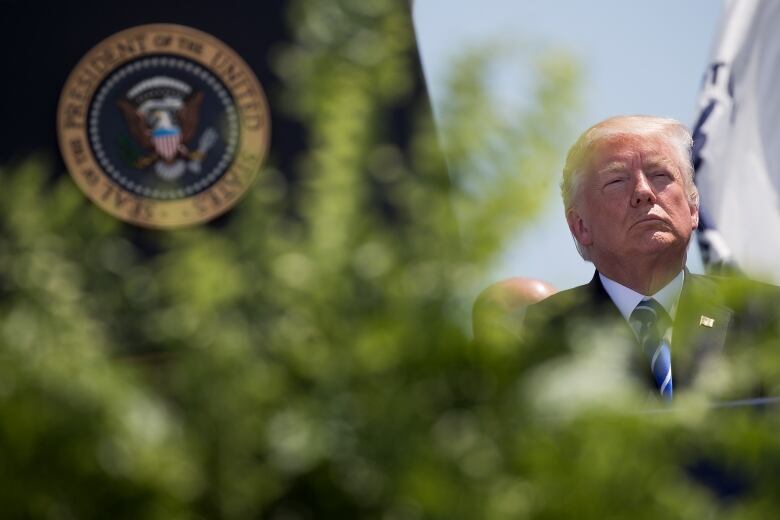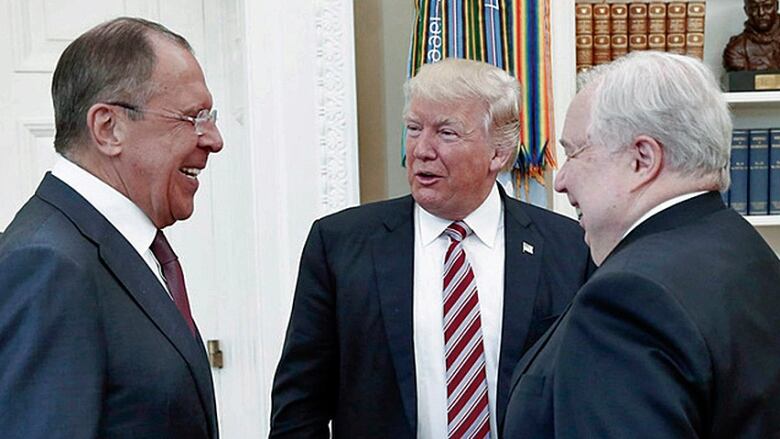Comey's statement to Senate intelligence committee shines credible spotlight on Trump-Russia saga
Trump isn't personally under investigation in Russia probe, but president can't cherry-pick Comey's notes

It is Donald Trump's own strange behaviour, and that of his friends, family and associates, on the Russia questions that has always been hardest to explain.
Why does he so often act like he has something to hide? Why do they lie and hide their dealings with the Russians?
Now that the evidence that Trump tried to meddle in the FBI's Russia investigation is available for viewing — in the advance copy of Comey's prepared opening statement to the Senate intelligence committee released Wednesday — it looks less and less like what he'd assured his core believers it was: "Fake news."
- LIVE BLOG | Comey testifies at Senate intelligence committee
- Read full text of James Comey's statement
Former FBI director James Comey will confirm on Thursday what was said to reporters by unnamed sources in May: that he has notes from all his conversations with Trump, some of them incriminating. And that they include the following details:
- In a one-on-one meeting, Comey felt Trump tried to get him to back off the investigation into former national security adviser Michael Flynn's contacts with Russia.
- After that meeting, Comey asked Attorney General Jeff Sessions to never leave him alone with Trump again.
- Trump tried to get Comey to say publicly that Trump was not personally under investigation.
- Trump wanted Comey's "loyalty."
This is still just Comey's side of it. But the story is no longer attributable only to the leakers and anonymous sources that the White House has tried to discredit.
It'll be Comey in public, on the record, nationally televised.

The details the former FBI director recollects in his notes flow all too neatly and worrisomely toward what Trump said in an NBC interview about having "this Russia thing" in mind when he fired Comey.
Comey does confirm, as Trump has said, that he told Trump on different occasions that he was not personally under investigation. But Trump cannot cherry-pick just that part of the Comey notes and dismiss all the rest — not reasonably.
James Comey's testimony is scheduled to begin at 10 a.m. ET on Thursday. Follow live coverage on our live blog at CBCNews.ca, our Facebook page, YouTube and on CBC News Network..
The fact that all the details will be in Comey's opening statement to the committee Thursday morning leaves one wondering what he has in store for a second act.
It's fairly certain he knows more than he's telling about the ongoing investigation, but that will likely be off limits for the Senate intelligence committee.
Resisting response
What's unlikely is that we'll be in for another round of the stonewalling that was on display Wednesday morning at a separate Senate intelligence committee hearing on the Foreign Intelligence Surveillance Act.
Time after time, the witnesses — director of national intelligence Dan Coats and NSA director Mike Rogers — refused to comment on conversations they'd had with the president, even though, as Coats admitted, they didn't know of any legal basis for them to refuse.
- 'I hope you can let this go': Comey says Trump wanted him to drop Flynn probe
- U.S. intelligence chiefs won't reveal details of conversations with Trump
The committee's questions grew out of another blockbuster report from the mainstream media: that Nixon nemesis, the Washington Post, which said Trump had tried to enlist Coats into leaning on Comey to ease up on the Russia probe.
Again, interference that sounds like an attempt to obstruct.

As Senator John McCain pointed out several times in soft-spoken awe Wednesday, there was "a lot of detail" in the Post story. There certainly was. And it had the ring of truth to it, too, as McCain implicitly recognized in his questions to Coats.
Maybe because Coats and McCain are old colleagues — not long ago they both sat as Republican senators on the intelligence committee — he finally gave up something more than just a refusal to comment.
"Just because it's published in the Washington Post doesn't mean…" And here you'd expect Coats to say "doesn't mean it's true." Instead, he said, "doesn't mean it's now unclassified."
Unless conversations that never happened are now classified, that was, like the non-denial denial, a non-confirmation confirmation that the conversation happened.
Demanding answers
But the more important thing from Wednesday morning's hearings might be that even some Republicans seem deadly serious about getting to the bottom of this Russia stuff.
At no time should you be in a position where you come to Congress without an answer.- Senator Richard Burr, chairman, Senate intelligence committee
Unlike the defensive deflections of Senate judiciary chair Chuck Grassley, or the disingenuous deceptions of House intelligence committee chair Devin Nunes, the determination of Senate intelligence committee chair Richard Burr is to get answers.
At the end of the hearing, in a polite and respectful tone, Burr, a Republican, told the intelligence chiefs to take this message back to the administration: "At no time should you be in a position where you come to Congress without an answer," he said. "The requirements of our oversight … demand it."
- Is the Trump-Russia scandal turning into another Watergate?
- Russia and the Trump administration — a timeline
Burr said if that means they resort to Gang of Eight briefings — briefings to the party leaders in both the House of Representatives and the Senate and the two ranking members of the respective intelligence committees only — so be it.
The Gang of Eight is for the most super-secret stuff. The president would support this if he also wanted Congress to get to the bottom of things. But again, his behaviour suggests he doesn't.

Trump is, after all, the president who reportedly told Russian Foreign Minister Sergey Lavrov and Russian Ambassador Sergey Kislyak that Comey was "a nut job" and that he fired him.
"I faced great pressure because of Russia. That's taken off," he said in their meeting.
Pictures taken by a Russian agency in the Oval Office — no Americans were allowed — show the president sharing a giggle with Lavrov and Kislyak.
Apparently, the topic of Russian interference in the election never came up.

